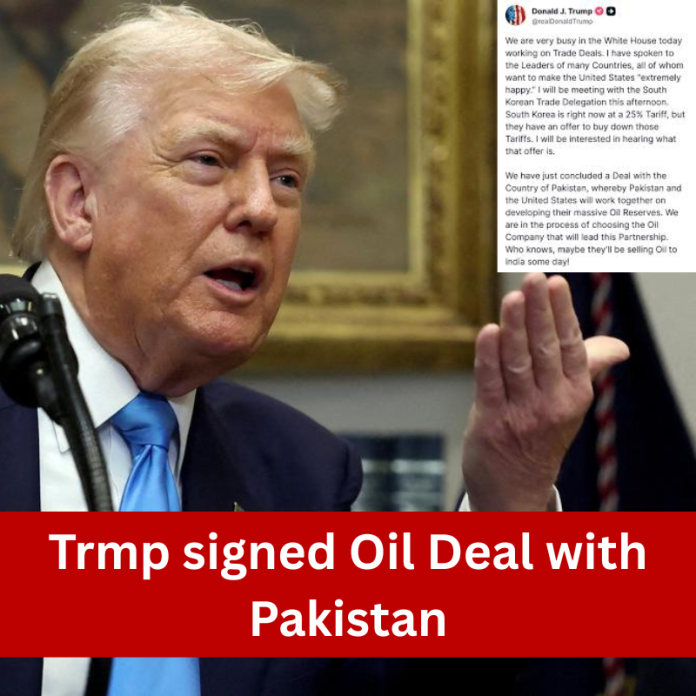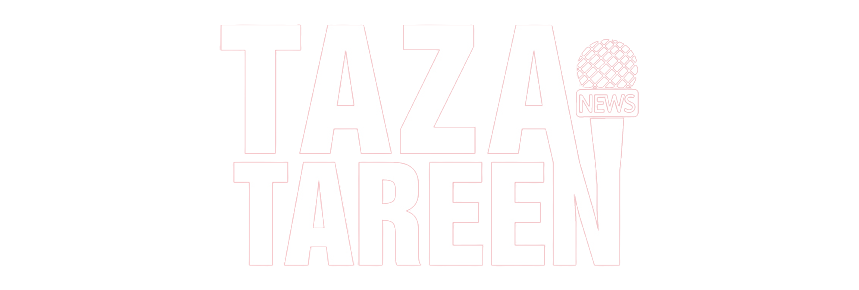A surprising announcement by former U.S. President Donald Trump has stirred headlines across South Asia. On July 30, 2025, Trump claimed that the United States has signed a “massive oil deal” with Pakistan. He suggested that Pakistan could one day be supplying oil to India. The bold statement went viral, especially in Pakistan and India, and sparked debates over whether this deal is real or just political talk.
But how true are these claims? And what does this so-called oil deal actually mean for Pakistan? Here’s everything we know so far, based on reliable sources and expert opinions.
What Did Trump Say?
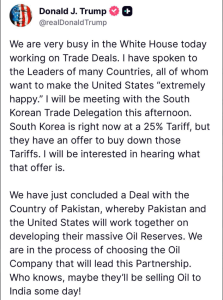
Trump made the announcement through a post on his social media platform, Truth Social. He stated that the U.S. and Pakistan have agreed to work together to develop Pakistan’s “massive oil reserves.” He added a dramatic line “Maybe they’ll be selling oil to India some day.” This one sentence created buzz on social media, triggering excitement, jokes, and confusion all at once.
The next day, Pakistani officials confirmed that a trade agreement had been reached between the two countries. However, there was no mention of oil or any exploration plans in the official statements. Pakistan’s Foreign Minister Ishaq Dar said, “Deal concluded,” but didn’t offer details on what the deal includes.
Does Pakistan Really Have Huge Oil Reserves?
This is the biggest question and the answer isn’t clear. According to energy experts and recent geological studies, Pakistan does not have confirmed massive oil reserves. While there have been some exploration efforts near the Arabian Sea and in Balochistan, none have produced results strong enough to support Trump’s claim.
In fact, even during past drilling projects with international oil companies, Pakistan failed to discover large commercial oil deposits. There are some smaller oil fields in Sindh and Punjab, but they are not enough to call Pakistan an “oil-rich” country.
So far, there’s no scientific evidence or public data proving that Pakistan is sitting on huge untapped oil reserves.
Political Timing: U.S., Pakistan, and India
The timing of this announcement has raised eyebrows. Just a day before the oil deal news, Trump announced 25% tariffs on Indian goods, starting from August 1. Many experts believe that this new “friendship” with Pakistan might be part of a bigger political game especially in the context of U.S.–India trade tensions.
Pakistani officials also mentioned that the agreement includes cooperation in minerals, energy, IT, and even crypto, but didn’t provide any specific names of companies, projects, or timelines. This has left analysts wondering whether the oil deal is more of a media stunt than an actual economic partnership.
X (Twitter) Reactions: What Are People Saying?
The story quickly went viral on X (Twitter), with mixed reactions.
Former Pakistani ambassador to the U.S., Husain Haqqani, commented, “U.S.–Pakistan trade deal: U.S. will develop ‘massive’ oil reserves in Pakistan. He is saying it straight.”
Meanwhile, journalist Sana Saeed tweeted, “Pakistan is believed to be home to the fourth largest oil & gas reserves.” However, this claim has been challenged by most energy experts.
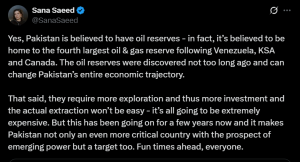
Public response on X has been divided. Some Pakistani users called it a big win for the country, while others made sarcastic jokes, saying things like, “Where are these oil reserves? Under Bahria Town?” or “Trump is just selling dreams like a YouTube crypto trader.”
In India, users saw it as a strategic message, especially with the new trade tensions. Indian commentators viewed the announcement as Trump’s way of poking Delhi while strengthening ties with Islamabad.
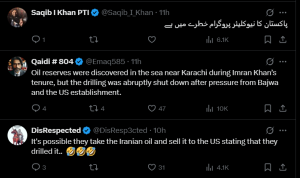
What’s the Reality?
So far, no U.S. company has confirmed involvement in any oil project in Pakistan. There is no data on where exploration will happen, who will invest, or how much oil is actually expected.
This lack of detail makes it clear: Trump’s statement might be more political than practical. It got people talking, but it hasn’t been backed up with facts, studies, or contracts. Pakistan’s oil dreams are still just that dreams, unless future developments prove otherwise.
Why This Matters for Pakistan?
For a country like Pakistan, which is facing economic challenges, rising fuel prices, and energy shortages, news of an oil discovery could offer hope. But false hopes can also damage credibility and distract from real policy issues.
If there is any truth to the oil claims, the government should share proper geological data, announce official tenders, and involve the public in the process. Otherwise, such news only serves to create viral headlines without long-term value.
Conclusion
Donald Trump’s claim about a U.S.–Pakistan oil deal has certainly created hype. But until there’s real evidence, exploration, and investment, the announcement remains more of a political headline than an energy breakthrough.
Pakistani citizens, media, and analysts should watch this story closely but also demand transparency and truth. After all, oil reserves don’t turn into wealth through tweets alone.

